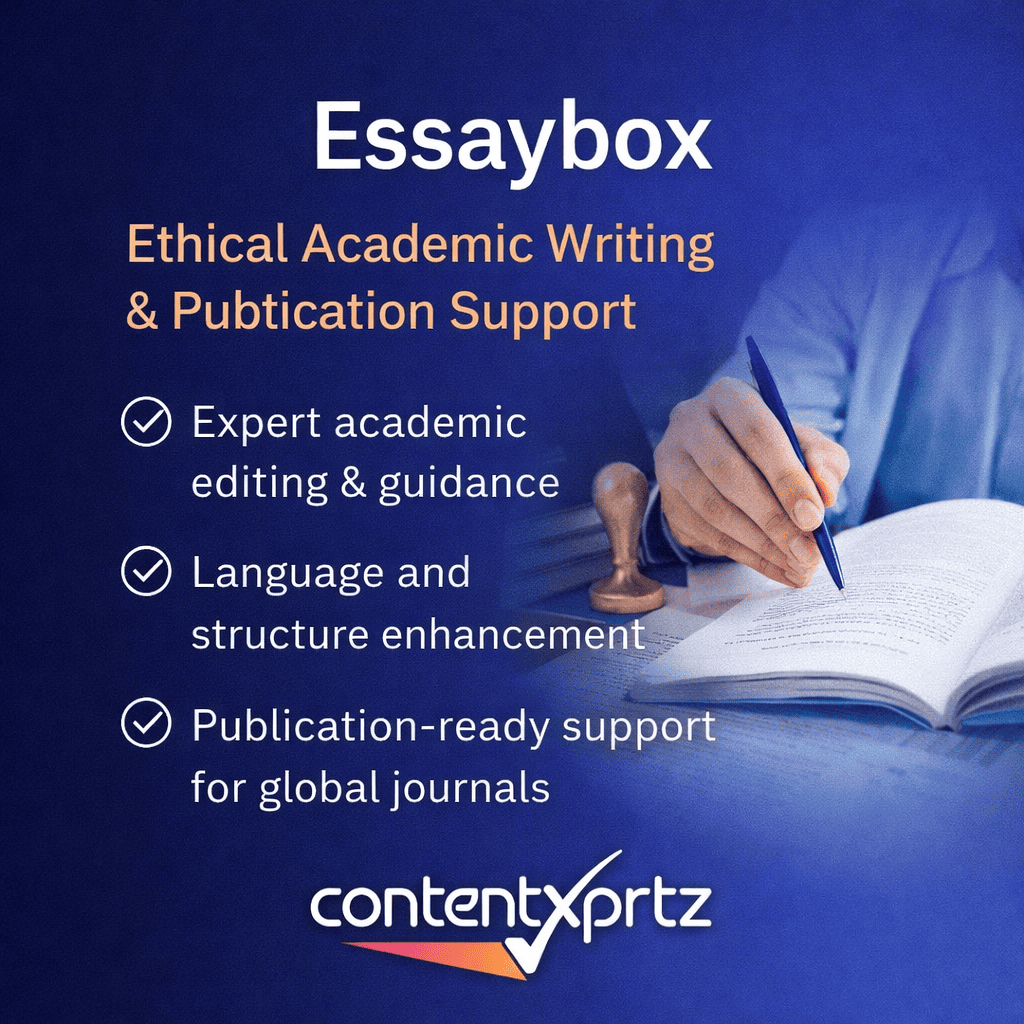Mastering the Art of Writing a Winning Proposal For Thesis: A Complete Guide for Scholars
Writing a proposal for thesis is one of the most defining moments in any researcher’s academic journey. It’s the foundation upon which your PhD or master’s research stands—a carefully structured plan that convinces supervisors and committees that your study is both feasible and meaningful. Yet, despite its significance, most students find this stage daunting. The pressure to balance originality, methodological rigor, and clarity often leaves many feeling overwhelmed.
According to a Springer study (2023), nearly 42% of doctoral candidates report facing anxiety when drafting their research proposals, citing lack of mentorship, time pressure, and publication demands as key challenges. This is especially true in competitive academic ecosystems where research approval determines funding and future opportunities.
At ContentXprtz, we understand these challenges deeply. Since 2010, we’ve supported thousands of PhD scholars, postgraduates, and early-career researchers across 110+ countries in transforming ideas into publication-ready proposals. Whether it’s defining research objectives, structuring methodology, or aligning your topic with journal requirements, our mission is to ensure your proposal demonstrates academic excellence and intellectual clarity.
Understanding the Importance of a Thesis Proposal
A proposal for thesis is more than just an outline; it’s a persuasive document that showcases your research vision, feasibility, and scholarly contribution. It answers three vital questions:
- What do you want to study?
- Why is it important?
- How will you conduct the research?
A strong thesis proposal convinces your supervisors that your study fills a meaningful gap in existing literature. According to Elsevier’s Research Academy, clarity of objectives and methodological alignment are the two most critical approval factors in proposal evaluation.
A well-written proposal also serves as a contractual roadmap—guiding you through the research process and preventing topic drift. When written strategically, it can even serve as a draft blueprint for your eventual dissertation chapters.
Common Challenges Faced by Scholars While Writing a Proposal For Thesis
Writing a thesis proposal involves juggling intellectual and emotional demands. Common hurdles include:
- Lack of clarity in research questions – Many students struggle to narrow their focus.
- Inadequate understanding of methodology – Selecting appropriate methods is often confusing without guidance.
- Time constraints – Balancing coursework, research, and personal life can lead to rushed submissions.
- Poor academic writing skills – Grammar, coherence, and citation errors can lower proposal quality.
- Limited supervisor feedback – Inconsistent mentorship can leave gaps in the proposal framework.
That’s where professional academic editing services like ContentXprtz’s PhD & Academic Services become invaluable. With expert editors, subject specialists, and consultants, we help scholars elevate the academic rigor and readability of their proposals—without compromising authenticity.
Key Components of a Strong Thesis Proposal
A compelling proposal for thesis typically includes the following essential sections:
1. Title Page and Abstract
Your title should be concise yet descriptive, reflecting both scope and purpose. The abstract (150–300 words) should summarize the research problem, objectives, methodology, and significance.
2. Introduction
Set the stage for your study. Explain the background, context, and theoretical rationale. Use transitions to connect the broader problem to your specific research focus.
3. Problem Statement
Define the research gap precisely. For example, if studying digital finance adoption, highlight what prior studies missed or where contradictions exist in current literature.
4. Research Objectives and Questions
State what you aim to achieve and the key questions your study will answer. These should align with your problem statement and theoretical framework.
5. Literature Review
Demonstrate familiarity with major works in your field. Incorporate citations from credible publishers like Taylor & Francis Online and Emerald Insight. This section showcases both your subject knowledge and analytical depth.
6. Methodology
Detail your research design, sample selection, data collection techniques, and analytical tools. The methodology should logically align with your research questions.
7. Expected Outcomes and Contribution
Describe how your findings will contribute to theory, practice, or policy. Mention potential publications or conferences where your work could be presented.
8. Timeline and Resources
Include a realistic schedule for each research phase and mention resources or software (SPSS, NVivo, SmartPLS) you intend to use.
9. References
Follow consistent citation styles such as APA 7th edition. Always link to original academic sources for credibility.
How to Write a Winning Proposal for Thesis: Step-by-Step Guide
Crafting a compelling proposal requires structure, precision, and storytelling. Here’s a proven step-by-step approach:
Step 1: Identify a Researchable Topic
Choose a topic that excites you and contributes to your field. Use academic databases like Scopus and Web of Science to identify literature gaps.
Step 2: Conduct a Preliminary Literature Review
Before writing, scan major journals to establish what has already been done. This helps avoid duplication and ensures novelty.
Step 3: Define the Research Gap and Objectives
Clearly articulate what your study seeks to achieve and why it matters. Reviewers are drawn to proposals that bridge theoretical and practical knowledge.
Step 4: Develop Your Research Design
Decide whether your study will be quantitative, qualitative, or mixed-method. Each design requires distinct tools and analysis strategies.
Step 5: Draft and Refine
Start writing each section with clarity. Use transitional phrases (“furthermore,” “however,” “as a result”) to improve readability.
Step 6: Seek Professional Review
Get your draft evaluated by experts. ContentXprtz’s Writing & Publishing Services ensure your proposal meets journal and institutional standards.
Best Practices for Crafting a Persuasive Thesis Proposal
- Stay focused and specific: Avoid broad generalizations.
- Maintain logical flow: Ensure each section connects smoothly.
- Use formal yet clear language: Avoid jargon unless necessary.
- Cite reliable sources: Support claims with verified data.
- Follow institutional formatting guidelines: Minor errors can cost approval.
- Proofread rigorously: Typos and inconsistencies can harm your academic credibility.
Professional PhD thesis help services can simplify this process, ensuring your document aligns with both academic expectations and ethical standards.
Why Choose ContentXprtz for Your Thesis Proposal Support
Since 2010, ContentXprtz has become a trusted partner for researchers seeking excellence in academic writing and publication. Here’s what sets us apart:
- Subject-Specific Expertise: Our editors hold advanced degrees from globally ranked universities.
- Comprehensive Support: From topic formulation to peer-review revision.
- Global Experience: Over 110 countries served, with local linguistic adaptation.
- Ethical Practices: 100% plagiarism-free, transparent, and confidential.
- Publication Assistance: Tailored guidance for top journals indexed in Scopus and WoS.
Explore our Student Writing Services and Corporate Writing Services for comprehensive academic and professional communication solutions.
FAQs on Writing a Proposal For Thesis
1. What is the primary purpose of a thesis proposal?
A thesis proposal outlines your research plan and justifies its importance. It helps committees evaluate whether your topic is relevant, feasible, and aligned with academic standards. It’s not just an administrative requirement—it’s the intellectual blueprint of your entire study.
2. How long should a thesis proposal be?
Most institutions recommend between 2,000–3,000 words for master’s and 4,000–6,000 words for doctoral proposals. However, quality matters more than length. Focus on coherence, logical argumentation, and evidence-based writing.
3. What mistakes should I avoid in my thesis proposal?
Common pitfalls include unclear research questions, lack of focus, and inconsistent formatting. Avoid overloading your proposal with unnecessary data or complex jargon. Simplicity and clarity enhance reviewer comprehension.
4. Can professional editing improve my proposal’s chances of approval?
Absolutely. Professional editors refine structure, coherence, and citation accuracy. Services like ContentXprtz’s PhD & Academic Services specialize in improving readability and compliance with institutional guidelines.
5. What’s the difference between a thesis proposal and a dissertation?
A thesis proposal is the research plan submitted for approval before conducting the study. A dissertation presents your findings after research completion. The proposal serves as your roadmap; the dissertation is the final product.
6. How do I choose the right methodology?
Your choice depends on your research questions. Quantitative studies test hypotheses using numerical data, while qualitative studies explore experiences or meanings. A mixed-method approach blends both for richer insights.
7. Should I include a theoretical framework in my proposal?
Yes. It demonstrates your understanding of established theories relevant to your topic. Frameworks like Behavioral Reasoning Theory, Expectancy Theory, or Competing Values Framework help justify your analytical approach.
8. How do I handle citations effectively?
Use reference managers like Zotero or Mendeley to maintain consistency. Follow recognized citation styles—APA, MLA, or Chicago—and always cite original works. Linking to sources like Emerald Insight enhances credibility.
9. What makes a proposal innovative?
Innovation comes from identifying gaps, challenging assumptions, or applying new methods. Proposals that integrate interdisciplinary perspectives often stand out to reviewers.
10. Can ContentXprtz help me draft and submit my proposal?
Yes. Our end-to-end research paper writing support includes topic ideation, editing, proposal drafting, and publication submission. Whether you need structural editing or comprehensive coaching, we’re here to guide you through every step.
Conclusion
A well-crafted proposal for thesis lays the foundation for academic success. It reflects your ability to think critically, plan systematically, and communicate scholarly ideas with precision. By investing time and expert support, you increase your chances of approval and long-term research impact.
At ContentXprtz, our mission is to empower researchers worldwide with ethical, high-quality, and tailored academic support. Explore our Writing & Publishing Services to get professional help in transforming your research ideas into approved, publication-ready proposals.
At ContentXprtz, we don’t just edit — we help your ideas reach their fullest potential.

